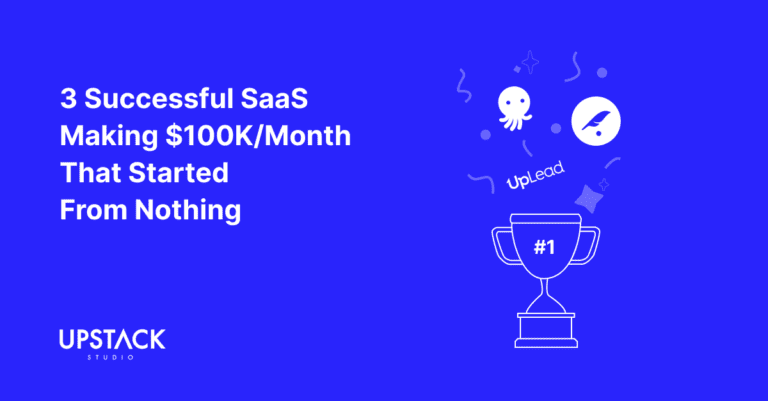A Non Tech Founder with a Million-dollar Idea
At Upstack Studio, we love it when a non-technical founder launches a successful tech startup.
Below is the story of how one such man turned his idea into a million-dollar software service.
GrooveHQ was founded in 2013 by Alex Turnbull as a help desk system to provide businesses with email support.

It belongs to the umbrella industry known as Software as a Service (Saas). Very, very competitive.
Nine years later, Groove has grown into a multimillion-dollar company under Alex’s leadership.
Here’s the thing. Alex doesn’t have a technical background.
He can’t code to save his life!
How did someone so un-nerdy create such a successful technical product?
In this article, we’re going to cover how Alex:
1. validated his idea,
2. came up with an initial prototype, and
3. iterated (and continues to iterate) the product for market fit
For those who’ve ever had an idea for a product or service but felt intimidated by a lack of technical knowledge, we think you’ll find a few important takeaways from Alex’s story.
Also, if you’re really pressed for time (aka lazy), scroll to the end for a tl;dr summary.
Validating His Idea
GrooveHQ lets teams share a company email and route the right messages to the right members so it doesn’t get lost once a hundred messages start coming in.
There have been hundreds of such software services.
GrooveHQ was entering an established market.
Alex didn’t try to be Gordon Ramsay and invent an experimental dish with weird combinations that no one had ever seen before.
That sort of thing really is best left to those with extensive technical and industry knowledge. Alex understood his limitation as a non-technical founder.
Instead, Alex took a basic recipe that was already popular and added slight changes to it.

Through the lens of marketing, this meant he didn’t have to go through the time-consuming process of explaining his product to customers from scratch.
He just needed to make one that his target customers would prefer.
Through his own personal experience in a previous business, Alex had already felt the pain of looking for a help desk system. They were all way too complicated.
This was then reinforced through Groove’s market gap analysis, where they looked at leading competitors and how they could find their niche.
The conclusion: something simple, stripped-down, and easy to use.
And since he couldn’t do it himself, he had to find someone to make it for him.
Launching a Prototype as a Non-Technical Founder
At this point all Alex had was an idea. One which required technical knowledge to execute.
The best step would have been to find a technical co-founder and offer some equity.
Alex certainly tried, but sadly there were no biters. After a while, it just wasn’t worth the wait.
The man needed his prototype.
Here, lacking technical knowledge was a real kick between the legs. If Alex had just hired a couple of developers, there was no way to tell if they were working or playing Counter-Strike.
We’re biased, but we think Alex took the next best step: he hired a software development agency to build the first version of GrooveHQ.
Like workers on the payroll, agencies won’t care about your product on an emotional level like you do.
Unlike workers, a good agency will tell you straight up if what you’re asking for isn’t possible. Their survival depends on a good reputation and happy clients, which means delivering as promised.
We know because that’s what we do at Upstack Studio. Seventy per cent of our clients are SME owners without technical knowledge, and we have to tell them ‘no’ all the time.
Whew, shameless plug done!
Of course, Alex met a few agencies before finding the right one.
The main disadvantage was as anyone could predict: cost. Alex spent $300,000 getting the agency to build his software.
The main advantage was that Alex didn’t need to worry about hiring or finding a partner. He was able to play to his strengths and leave the technical parts to the geeks.
Four months after Alex engaged the agency, the first iteration of GrooveHQ was born.
Armed with a tangible beta version, Alex was then able to raise $700,000 from early investors.
Huge, huge lesson here: you get what you pay for.
Product Iteration and Market Fit
Groove continuously collects feedback on three important points:
- New users are asked what they hope to get.
- Active users are asked what they’ve enjoyed using most.
- Users who want to cancel are asked what the breaking point(s) were.
In the early days, things were awful. Customers reported tons of bugs and glitches.
They also constantly made requests for new, custom features based on their own company case uses.
By now, Alex had a small in-house team of senior and junior developers, and they were drowning in a sea of work.
As much as they added, sales continued to stagnate, then drop.
Alex realised he’d committed a cardinal sin of app development: thinking more is more. More features, more value, more happy customers right?

Nope. Less is more.
Keep it simple, and keep it focused.
The Groove team rethought their iteration process. No more saying “yes” to everything. New suggestions would be sorted into ‘must-have’, ‘nice-to-have’ and ‘hell no’ piles.
It wouldn’t please everyone, and that was fine.
For the same amount of revenue, it’s better to make a large profit from a few buyers than a small profit from many.
When your margins are high, you can invest in R&D.
When your margins are small, your focus is on cost-cutting and praying a factory in China doesn’t figure out how to do the same thing.
Alex was also determined not to compete based on price. It spoils the market and you attract tight-fisted customers who leave the moment there is a cheaper option.
Today, GrooveHQ isn’t the most complex or affordable sales management software.
However, it is among the best at what it tries to do, which is to be as simple as possible while still leaving space for customization.
Users love its simplicity and leanness. Negative reviewers dislike its simplicity and leanness.
If you ask us, it sounds like GrooveHQ has found its market fit.
Takeaways for Non-Technical Founders
Here are four things Alex did brilliantly as a non-technical founder:
- Entering an established market knowing there was demand.
- Finding the right partner to build a prototype.
- Collecting customer feedback from multiple points
- Iterating the product/service based on a specific audience
Alex’s lack of technical knowledge didn’t do him any favors.
But you know what, it didn’t stop him from building a highly successful technical product.
You don’t have to be Gordon Ramsay to own a restaurant, and you don’t have to be Bill Gates to build successful software.
Most of it is being mindful of our limitations.
The rest is just sound business strategies.
That said, what are the concerns or challenges you’ve faced when developing a technical product? Let us know below and we’ll get back to you.








